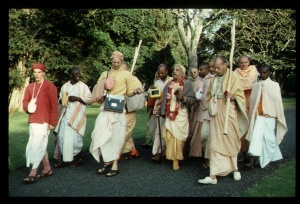SB 6.14.4: Difference between revisions
m (1 revision(s)) |
No edit summary |
||
| Line 1: | Line 1: | ||
{{info | {{info | ||
|speaker= | |speaker=King Parīkṣit | ||
|listener= | |listener=Śukadeva Gosvāmī | ||
}} | }} | ||
[[Category:Srimad-Bhagavatam - Canto 06 Chapter 14|s04 ]] | |||
[[Category:Bhagavatam Verses Spoken by Pariksit Maharaja - Vanisource|061404]] | |||
<div style="float:left">'''[[Srimad-Bhagavatam]] - [[SB 6|Sixth Canto]] - [[SB 6.14: King Citraketu's Lamentation|Chapter 14: King Citraketu's Lamentation]]'''</div> | |||
<div style="float:right">[[File:Go-previous.png|link=SB 6.14.3]] '''[[SB 6.14.3]] - [[SB 6.14.5]]''' [[File:Go-next.png|link=SB 6.14.5]]</div> | |||
{{RandomImage}} | |||
==== TEXT 4 ==== | ==== TEXT 4 ==== | ||
<div class="verse"> | |||
<div | :prāyo mumukṣavas teṣāṁ | ||
prāyo mumukṣavas teṣāṁ | :kecanaiva dvijottama | ||
kecanaiva dvijottama | :mumukṣūṇāṁ sahasreṣu | ||
mumukṣūṇāṁ sahasreṣu | :kaścin mucyeta sidhyati | ||
kaścin mucyeta sidhyati | |||
</div> | </div> | ||
| Line 17: | Line 22: | ||
==== SYNONYMS ==== | ==== SYNONYMS ==== | ||
<div class="synonyms"> | |||
<div | ''prāyaḥ''—almost always; ''mumukṣavaḥ''—persons interested in liberation; ''teṣām''—of them; ''kecana''—some; ''eva''—indeed; ''dvija-uttama''—O best of the ''brāhmaṇas''; ''mumukṣūṇām''—of those who desire to be liberated; ''sahasreṣu''—in many thousands; ''kaścit''—someone; ''mucyeta''—may be actually liberated; ''sidhyati''—someone is perfect. | ||
</div> | </div> | ||
| Line 25: | Line 29: | ||
==== TRANSLATION ==== | ==== TRANSLATION ==== | ||
<div class="translation"> | |||
<div | |||
O best of the brāhmaṇas, Śukadeva Gosvāmī, out of many persons who follow religious principles, only a few desire liberation from the material world. Among many thousands who desire liberation, one may actually achieve liberation, giving up material attachment to society, friendship, love, country, home, wife and children. And among many thousands of such liberated persons, one who can understand the true meaning of liberation is very rare. | O best of the brāhmaṇas, Śukadeva Gosvāmī, out of many persons who follow religious principles, only a few desire liberation from the material world. Among many thousands who desire liberation, one may actually achieve liberation, giving up material attachment to society, friendship, love, country, home, wife and children. And among many thousands of such liberated persons, one who can understand the true meaning of liberation is very rare. | ||
</div> | </div> | ||
| Line 32: | Line 35: | ||
==== PURPORT ==== | ==== PURPORT ==== | ||
<div class="purport"> | |||
There are four classes of men, namely ''karmīs'', ''jñānīs'', ''yogīs'' and ''bhaktas''. This statement pertains especially to ''karmīs'' and ''jñānīs''. A ''karmī'' tries to he happy within this material world by changing from one body to another. His objective is bodily comfort, either in this planet or in another. When such a person becomes a ''jñānī'', however, be aspires for liberation from material bondage. Among many such persons who aspire for liberation, one may actually be liberated during his life. Such a person gives up his attachment for society, friendship, love, country, family, wife and children. Among many such persons, who are in the ''vānaprastha'' stage, one may understand the value of becoming a ''sannyāsī'', completely accepting the renounced order of life. | |||
</div> | |||
<div | <div style="float:right; clear:both;">[[File:Go-previous.png|link=SB 6.14.3]] '''[[SB 6.14.3]] - [[SB 6.14.5]]''' [[File:Go-next.png|link=SB 6.14.5]]</div> | ||
__NOTOC__ | |||
</div> | __NOEDITSECTION__ | ||
__NOTOC__ | |||
Revision as of 16:10, 13 May 2021

A.C. Bhaktivedanta Swami Prabhupada
TEXT 4
- prāyo mumukṣavas teṣāṁ
- kecanaiva dvijottama
- mumukṣūṇāṁ sahasreṣu
- kaścin mucyeta sidhyati
SYNONYMS
prāyaḥ—almost always; mumukṣavaḥ—persons interested in liberation; teṣām—of them; kecana—some; eva—indeed; dvija-uttama—O best of the brāhmaṇas; mumukṣūṇām—of those who desire to be liberated; sahasreṣu—in many thousands; kaścit—someone; mucyeta—may be actually liberated; sidhyati—someone is perfect.
TRANSLATION
O best of the brāhmaṇas, Śukadeva Gosvāmī, out of many persons who follow religious principles, only a few desire liberation from the material world. Among many thousands who desire liberation, one may actually achieve liberation, giving up material attachment to society, friendship, love, country, home, wife and children. And among many thousands of such liberated persons, one who can understand the true meaning of liberation is very rare.
PURPORT
There are four classes of men, namely karmīs, jñānīs, yogīs and bhaktas. This statement pertains especially to karmīs and jñānīs. A karmī tries to he happy within this material world by changing from one body to another. His objective is bodily comfort, either in this planet or in another. When such a person becomes a jñānī, however, be aspires for liberation from material bondage. Among many such persons who aspire for liberation, one may actually be liberated during his life. Such a person gives up his attachment for society, friendship, love, country, family, wife and children. Among many such persons, who are in the vānaprastha stage, one may understand the value of becoming a sannyāsī, completely accepting the renounced order of life.